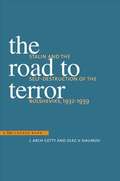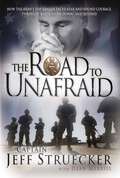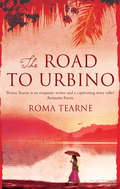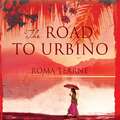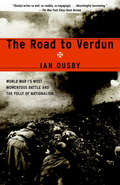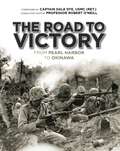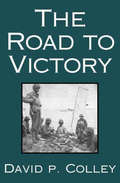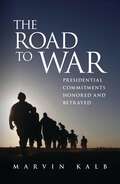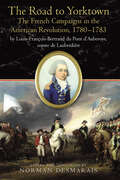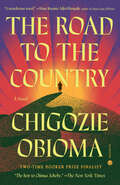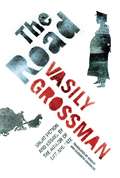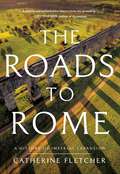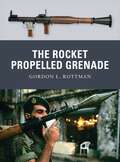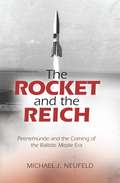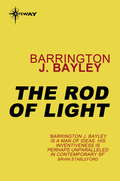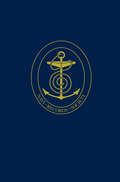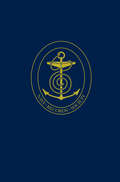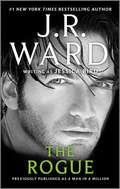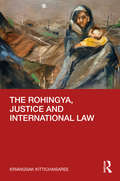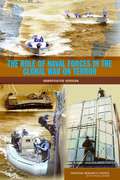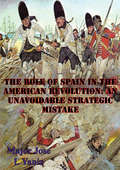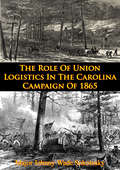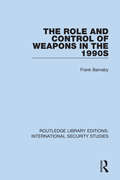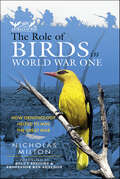- Table View
- List View
The Road to Terror: Stalin and the Self-destruction of the Bolsheviks, 1932-1939
by J. Arch Getty Oleg V. NaumovNow updated with new facts, and abridged for use in Soviet history courses, this gripping book assembles top secret Soviet documents, translated into English, from the era of Stalin's purges. The dossiers, police reports, private letters, secret transcripts, and other documents expose the hidden inner workings of the Communist Party and the dark inhumanity of the purge process. "[This] book will be of great value to students of the Terror and . . . the material, such as Bukharin's last letter, is astounding. "--Michael J. Ybarra,Wall Street Journal "It will be indispensable for all historians and researchers of communism, the USSR, and Stalinism for many decades to come. "--Roy A. Medvedev, author ofLet History Judge
The Road to Unafraid: How the Army's Top Ranger Faced Fear and Found Courage through
by Jeff StrueckerJeff Struecker, a "Black Hawk Down" hero, the Army's Top Ranger, now an Army Chaplain, relates his own tales from the frontlines of every U.S. initiative since Panama, and tells how God taught him faith from the front in fear-soaked times. As readers go on-mission with Struecker through his harrowing tales, they will learn how to face their own fears with faith in a mighty God. Just as he told one of his charges in Mogadishu: "The difference between being a coward and a hero is not whether you're scared, it's what you do while you're scared."
The Road to Urbino
by Roma TearneA story of obsession, love and art set in Tuscany, Sri Lanka and London. Ras, a Sri Lankan who fled his country as a child following the violent death of his mother and his father's disappearance, has committed a crime. Dogged by his past and unable to come to terms with the killing of his mother, he struggles to make a new life for himself in the UK. Alex has loved Dee since he was 19 but failed to realise that it was a love he wouldn't find again. After Dee's marriage, he too struggles to build a meaningful life for himself.But when Ras' and Alex's lives connect, each man takes a new path culminating for Ras in the theft of a della Franceso painting, while Alex comes ever closer to Dee through tragedy in her life. Beautifully written, with a strong narrative, The Road to Urbino is the story of two very different men and their love for the women in their lives, set against the backdrop of the heartbreaking horrors of the long-running conflict in Sri Lanka.
The Road to Urbino
by Roma TearneA story of obsession, love and art set in Tuscany, Sri Lanka and London. Ras, a Sri Lankan who fled his country as a child following the violent death of his mother and his father's disappearance, has committed a crime. Dogged by his past and unable to come to terms with the killing of his mother, he struggles to make a new life for himself in the UK. Alex has loved Dee since he was 19 but failed to realise that it was a love he wouldn't find again. After Dee's marriage, he too struggles to build a meaningful life for himself.But when Ras' and Alex's lives connect, each man takes a new path culminating for Ras in the theft of a della Franceso painting, while Alex comes ever closer to Dee through tragedy in her life. Beautifully written, with a strong narrative, The Road to Urbino is the story of two very different men and their love for the women in their lives, set against the backdrop of the heartbreaking horrors of the long-running conflict in Sri Lanka.
The Road to Verdun
by Ian OusbyVerdun was the largest, the longest and the bloodiest battle between the French and Germans in the First World War, lasting from February 1916 until the end of the year and claiming more then 700,000 casualties. For the French in particular, it was always more than just a battle, being rather (in Paul Valery's words) 'a complete war in itself, inserted in the Great War'. Ian Ousby's masterly book gives a dramatic and brilliantly illuminating account of the generals' planning and the troops' suffering. At the same time it challenges the narrow horizons of military history by locating the experience of Verdun in how the French had thought about themselves since the debacle of the Franco-Prussian War. Verdun emerges as the mid-point in the cycle of Franco-German hostility, carrying both the burden of history and - if only by the presence on the battlefield of men like Petain and de Gaulle, France's two leaders in the next war - the seeds of the future. THE ROAD TO VERDUN will radically challenge every reader's view of France - and the very nature of warfare.
The Road to Victory: From Pearl Harbor to Okinawa
by Dale DyeOn December 7, 1941, as the Japanese dived out of the clouds above Pearl Harbor, America's future was fundamentally altered. Ever since the first world conflict, the United States had resisted the temptation to be drawn into wars outside of its borders. But with this one surprise attack America was inevitably thrown into the fray as the Second World War erupted. This new history by military specialists, Osprey Publishing, reveals each of the battles America would fight against Imperial Japan from the naval clashes at Midway and Coral Sea to the desperate, bloody fighting on Iwo Jima and Okinawa. Each chapter reveals the horrors of battle and the grim determination to wrest victory from certain defeat. Using an astonishing collection of wartime imagery and complete with dozen of full-colour maps, this is an invaluable visual guide to the road to victory.From the Hardcover edition.
The Road to Victory: The Untold Story Of Race And World War Ii's Red Ball Express
by David P. ColleyThis &“important contribution to WWII history&” reveals the trucking convoy, manned by unsung black soldiers, who helped defeat the Nazis (Publishers Weekly). After the D-Day landings in Normandy, Allied forces faced a golden opportunity—and a critical challenge. They had broken across enemy lines, but there was no infrastructure to supply troops as they pushed into Germany. The US Army improvised a perilous solution: a convoy of trucks marked with red balls that would carry desperately needed ammunition, rations, and fuel deep into occupied Europe. The so-called Red Ball Express lasted eighty-one days and, at its height, numbered nearly six thousand trucks. The mission risked attacks by the Luftwaffe and German ground forces, making it one of the GIs&’ most daring gambits. Without the soldiers who successfully executed this operation, World War II would have dragged on in Europe at a terrible cost of Allied lives. Yet the service of these brave drivers, most of whom were African American, has been largely overlooked by history. The first book-length study of the subject, The Road to Victory chronicles the exploits of these soldiers in vivid detail. It&’s a story of a fight not only against the Nazis, but against an enemy closer to home: racism.
The Road to War
by Marvin KalbNot since Pearl Harbor has an American president gone to Congress to request a declaration of war. Nevertheless, since then, one president after another, from Truman to Obama, has ordered American troops into wars all over the world. From Korea to Vietnam, Panama to Grenada, Lebanon to Bosnia, Afghanistan to Iraq-why have presidents sidestepped declarations of war? Marvin Kalb, former chief diplomatic correspondent for CBS and NBC News, explores this key question in his thirteenth book about the presidency and U.S. foreign policy.Instead of a declaration of war, presidents have justified their war-making powers by citing "commitments," private and public, made by former presidents. Many of these commitments have been honored, but some betrayed. Surprisingly, given the tight U.S.-Israeli relationship, Israeli leaders feel that at times they have been betrayed by American presidents. Is it time for a negotiated defense treaty between the United States and Israel as a way of substituting for a string of secret presidential commitments?From Israel to Vietnam, presidential commitments have proven to be tricky and dangerous. For example, one president after another committed the United States to the defense of South Vietnam, often without explanation. Over the years, these commitments mushroomed into national policy, leading to a war costing 58,000 American lives. Few in Congress or the media chose to question the war's provenance or legitimacy, until it was too late. No president saw the need for a declaration of war, considering one to be old-fashioned.The word of a president can morph into a national commitment. It can become the functional equivalent of a declaration of war. Therefore, whenever a president "commits"the United States to a policy or course of action with, or increasingly without, congressional approval, watch out-the White House may be setting the nation on a road toward war. The Road to War was a 2013 Foreword Reviews honorable mention in the subject of War & Military.
The Road to Yorktown: The French Campaigns in the American Revolution, 1780–1783
by Norman DesmaraisThe fate of the American Revolution had yet to be decided when a remarkable 21-year-old Frenchman arrived in America. Louis-François-Bertrand, the Count of Lauberdière, belonged to an old noble family that traced its heritage back to the Crusades. His father, François-Charles-Mathieu, was musketeer of the guard of King Louis XV. More important, his uncle was General Rochambeau, the commander of all French forces in America. The Count of Lauberdière kept one of the most remarkable diaries of the entire war, and it is published here for the first time as The Road to Yorktown: The French Campaigns in the American Revolution, 1780-1783, by Louis-François-Bertrand du Pont d’Aubevoye, comte de Lauberdière, translated and edited by Norman Desmarais. Serving as aide-de-camp on General Rochambeau’s staff, the young and well-educated Lauberdière enjoyed a unique perspective of the war. He rubbed shoulders with some of the Revolution’s most important personalities (including George Washington and Lafayette), and was in the epicenter of many of the war’s momentous events. His journal covers a host of topics in remarkable detail, including descriptions of the French army’s camp in Newport, Rhode Island, the long march to Yorktown, the siege, and capture, and a fascinating examination of the people and their distinctive colonial culture. His keen eye and sharp descriptions of the Army’s daily activities and movements provide a wealth of information for inquisitive readers and historians—details found only in this diary. For example, nearly all French diaries mention the army’s arrival and landing at Newport, but only Lauberdière’s identifies exactly where it occurred. Anti-French prejudices were common, and the nephew recorded how Rochambeau dispelled them and won over the locals. Culture fascinated the young Count, who keenly observed how the colonials attempted to imitate European manners and styles, marveling at how Philadelphia adopted Parisian fashions in the brief time between his visits there. He even visited Washington’s home at Mount Vernon and made pointed comments about his wife, Martha. With its expertly crafted footnotes, maps, and illustrations, The Road to Yorktown offers a fresh and invigorating firsthand account that will satisfy even the most demanding student of the American Revolution.
The Road to the Country: A Novel
by Chigozie ObiomaA sweeping, heart-racing, mystical novel about a university student in Lagos trying to save his brother, and himself, amid the chaos of Nigeria&’s civil war—a story of love, friendship, and personal triumph by the two-time Booker Prize finalist and &“the heir to Chinua Achebe&” (New York Times)&“A wondrous novel.&”—Nana Kwame Adjei-Brenyah, author of Chain-Gang All Stars, finalist for the National Book Award&“Chigozie Obioma is that rare thing: an original. His world is a mix of the real and the folkloric, and his writing sounds like no one else&’s.&”—The Wall Street JournalThe first images of the vision are grainy—like something seen through wet glass. But slowly it clears, and there appears the figure of a man.Set in Nigeria in the late 1960s, The Road to the Country is the epic story of a shy, bookish student haunted by long-held guilt who must go to war to free himself. When his younger brother disappears as the country explodes in civil war, Kunle must set out on an impossible rescue mission. Kunle&’s search for his brother becomes a journey of atonement that will see him conscripted into the breakaway Biafran army and forced to fight a war he hardly understands, all while navigating the prophecies of a local Seer, he who marks Kunle as an abami eda—one who will die and return to life.The story of a young man seeking redemption in a country on fire, Chigozie Obioma&’s novel is an odyssey of brotherhood, love, and unimaginable courage set during one of the most devastating conflicts in the history of Africa. Intertwining myth and realism into a thrilling, inspired, and emotionally powerful novel, The Road to the Country is the masterpiece of Chigozie Obioma, a writer Salman Rushdie calls &“a major voice&” in literature.
The Road: Short Fiction and Essays
by Vasily GrossmanBy the author of Life and Fate, now a major Radio 4 drama starring Kenneth Branagh. Vasily Grossman is widely recognized as one of the outstanding literary figures of the twentieth century. The short fiction collected here - satire, comedy, tragedy and pure narrative - illustrate the remarkable breadth of his work, and demonstrate all the bold intelligence, delicate irony and extraordinary vividness for which he has become known. In addition to the eleven stories, this volume includes the complete text of 'The Hell of Treblinka', one of the first descriptions of a Nazi extermination camp; a powerful and harrowing piece of journalism written only weeks after the camp was dissolved. Beautifully illuminated by Robert Chandler's introductions and endnotes, with photographs from the family archive, and an Afterword by Grossman's stepson, Fyodor Guber.
The Roads to Rome: A History of Imperial Expansion
by Catherine FletcherInspired by original research and filled with color and drama, this is an exploration of two thousand years of history as seen through one the greatest imperial networks ever built."All roads lead to Rome&” is a medieval proverb, but it's also true: today's European roads still follow the networks of the ancient empire—and these ancient roads continue to grip our modern imaginations as a physical manifestation of Rome&’s extraordinary greatness. Over the two thousand years since they were first built, these roads have been walked by crusaders and pilgrims, liberators and dictators, but also by tourists and writers, refugees and artists. As channels of trade and travel—and routes for conquest and creativity—Catherine Fletcher reveals how these roads forever transformed the cultures, and intertwined the fates, of a vast panoply of people across Europe and beyond. The Roads to Rome is a magnificent journey into a past that remains intimately connected to our present. Traveling from Scotland to Cádiz to Istanbul and back to Rome, the reader meanders through a series of nations and empires that have risen and fallen. Along the way, we encounter spies, bandits, scheming innkeepers, a Byzantine noblewoman on the run, young aristocrats on their Grand Tour, a conquering Napoleon, John Keats, the Shelleys, the abolitionist Frederick Douglass, and even Mussolini on his motorbike. Reflecting on his own walk on the Appian Way, Charles Dickens observed that here is "a history in every stone that strews the ground.&” Based on vibrant original research, this is the first narrative history to tell the full story of life on the roads that lead to Rome.
The Rocket Propelled Grenade
by Ramiro Bujeiro Gordon RottmanOsprey's new Weapon series provides a highly-detailed yet affordable overview of the development, use, and impact of small arms throughout history - from the sword to the machine gun.Learn the surprising truths behind one of modern warfare's most popular and controversial firearms. Developed immediately after World War II, the RPG-series have proved to be simple, flexible, and powerful devices, which have had an impact far beyond original expectations. Track its development and deployment firsthand, from the Vietnam hills to the streets of modern Baghdad.Gordon Rottman provides a detailed analysis of perhaps one of the most important weapons to be developed in the 20th century. He has been at the receiving end of the RPG-2 and RPG-7 as well as firing them himself, providing personal testament to the effectiveness with which they accomplished their missions. This in-depth coverage is well-accompanied by Ramiro Bujeiro's battlescene artwork and Tony Bryan's cutaway illustrations.
The Rocket and the Reich: Peenemunde and the Coming of the Ballistic Missile Era
by Michael J. NeufeldWINNER OF THE DEXTER PRIZE OF THE SOCIETY FOR THE HISTORY OF TECHNOLOGY Launched by the Third Reich in late 1944, the first ballistic missile, the V-2, fell on London, Paris, and Antwerp after covering nearly two hundred miles in five minutes. It was a stunning achievement, one that heralded a new age of ballistic missiles and space launch vehicles. Michael J. Neufeld gives the first comprehensive and accurate account of the story behind one of the greatest engineering feats of World War II. At a time when rockets were minor battlefield weapons, Germany ushered in a new form of warfare that would bequeath a long legacy of terror to the Cold War, as well as the means to go into space. Both the US and USSR's rocket programs had their origins in the Nazi state.
The Rod of Light: The Soul of the Robot Book 2 (SOUL OF THE ROBOT)
by Barrington J. BayleyRobot evolution has advanced to the point that intelligent robots have liberated themselves from servitude, defending themselves from servitude, defending themselves against the humans who work to exterminate them using super-machines.The ultimate hope of the most powerfully intelligent robots lies in the attainment of human consciousness. And they are willing to steal men's souls if they must, to get this final elusive quality for themselves.Only one free robot, Jasperodus, has been granted true consciousness - a soul - by his maker, now long dead. Brought into the soul research project by force, Jasperodus faces a moral dilemma: to release his secret and bring about the final downfall of humanity to a new race of super-robots, or to keep his own kind forever from the light of consciousness. And the mechanized armies of the humans press ever forward, seeking the robot hideout.
The Rodney Papers: Volume I, 1742–1763: Selections from the Correspondence of Admiral Lord Rodney (Navy Records Society Publications #148)
by David SyrettOverbearing, avaricious and difficult, yet talented and ambitious, George Brydges Rodney has never attracted much sympathy or understanding. He was nevertheless an original thinker and one of the great admirals of the eighteenth century. The contents of this volume, the first of three, document his career from 1742 until 1763 - his private and political life. His early years as a captain were spent in the severe conditions of the North Sea and in taking privateers in the western approaches. During the peace after 1748 he was Governor of Newfoundland and in the Seven Years' War blockaded Le Havre before going, as a flag officer, to command in the Leeward Islands where he participated in the capture of Martinique. This volume also contains letters to his wife which indicate, against past opinion, that Rodney had a heart.
The Rodney Papers: Volume II: 1763-1780: Selections from the Correspondence of Admiral Lord Rodney (Navy Records Society Publications #148)
by David SyrettThis, the second of three volumes of the correspondence of George Brydges Rodney, covers the admiral's life from the end of the Seven Years War in 1763 until August 1780. This was perhaps his most eventful, extraordinary and controversial period; from being a successful admiral, a member of Parliament and the Governor of Greenwich Hospital, Rodney plunges into debt and a debtor's exile in France, only to rise again as a victorious admiral and as a national hero. At the end of the Seven Years War Rodney was disappointed and bitter at the failure of the British government to reward him for his prominent part in the capture of Martinique and other French islands in the West Indies. He was made baronet in 1764 and governor of Greenwich Hospital in 1765. He had already been a member of Parliament for Saltash in 1751-4, and sat for Okehampton, Penryn and Northampton consecutively between 1759 and 1774. In 1768 he was involved in one of the most costly elections in eighteenth century parliamentary history. He secured election at Northampton, but his finances were broken. Furthermore, he had begun to gamble heavily and, with a limited income, fell into the hands of moneylenders. In 1770 he attempted to recoup his finances by becoming Commander-in-Chief at Jamaica. Nevertheless in the West Indies until 1774 Rodney managed a successful period of diplomacy with Spain, of intelligence gathering, and of navigational surveying especially off the coast of Florida. Even so, he returned to England deeply in debt and was forced to flee to France to escape his creditors. The war with the American colonies proved to be Rodney's salvation. After war with France had broken out, in 1779 the British government was desperate for an admiral who could fight and win battles. Rodney was appointed Commander-in-Chief in the Leeward Islands. His success in battle and skillful conduct of the naval war in the West Indies in 1780 restored Rodney's public standing. The stage was set for his most famous victory, the Battle of the Saintes in 1782, and the restoration of his private finances. George Brydges Rodney had gone through a dramatic change of fortunes. The character of that man is revealed here. This volume will permit re-assessment of this outstanding British admiral of the American War of Independence for a new generation of historians.
The Rogue: The Rebel The Player The Renegade The Rogue
by J. R. WardOnly one woman can get past his guard in the final installment of the beloved Moorehouse Legacy series from J.R. Ward, writing as Jessica Bird. Originally published as A Man in a Million in 2007.Michael “Spike” Moriarty has had a thing for Madeline Maguire ever since she first walked up to him as if she wasn’t the most gorgeous woman on the planet and asked to see his tattoos. But he knows that the attraction can only go one way—he could never be the man for her. He has a dark history that very few know about, and even worse, it’s all about to come to the surface.Madeline’s been burned enough in the past to know better, but Spike is the only man that has caught her eye time and time again. For some reason, he’s determined to avoid her, but when she desperately needs help to ward off her scheming family, Spike is the one at her side. And even though he says they can only be friends, his actions tell a very different story…
The Rohingya, Justice and International Law
by Kriangsak KittichaisareeWritten by an international judge, professor and former ambassador with decades of experience in the field, this is an incisive and highly readable book about international law as well as realpolitik in bilateral and multilateral diplomacy in the quest for justice by victims of serious human rights violations amounting to grave crimes of international concern. Focusing on the plight of the ethnic and religious group of persons called the ‘Rohingya’, normally residing in Myanmar, as the case study, the book elaborates the complex legal technicalities and impediments in international courts and foreign domestic criminal courts exercising ‘universal jurisdiction’ in relation to acts amounting to genocide, crimes against humanity and/or war crimes. It builds on and adds value to existing literature on the international law applicable to the protection of human rights as interpreted by the International Court of Justice as well as that on the international criminal justice meted out by domestic criminal courts, ad hoc international criminal tribunals and the permanent International Criminal Court. The book will be essential reading for students, researchers and academics in public international law, international criminal law, international human rights law as well as government officials and those working for NGOs and international organizations with mandates in these fields.
The Role Of Naval Forces In The Global War On Terror
by National Research Council of the National AcademiesThe growth of the terrorism threat to the nation’s security has created significant strategic challenges for U.S. armed forces in fighting this global war on terrorism (GWOT). For the Navy, the challenges have centered on developing maritime capabilities to prosecute the GWOT as far forward as possible. To assist the Navy’s planning in this area, the former Chief of Naval Operations requested the NRC to conduct an assessment of the adequacy of and prospects for improving the role of Naval Forces in the GWOT. The study developed a defense-in-depth framework as the organizing principle for the report. The report contains information as described in 5 U.S.C. 552(b) and therefore could not be released to the public in its entirety. The public version consists of an executive summary that presents an assessment of the transformation of naval forces for addressing the GWOT; a brief description of the defense-in-depth framework; and a list of findings and major recommendations.
The Role Of Spain In The American Revolution: An Unavoidable Strategic Mistake
by Major Jose I. YanizSpain played a significant role in the outcome of the American Revolution by providing economic support and opening war fronts to fight the British in Europe and North America. Spain's support for the revolutionaries was a strategic mistake for its government, for it was not in Spain's national interests as a colonial power to do this.Neither France nor Spain helped the North American colonies to gain independence from Great Britain for altruistic reasons. Instead, both countries were eager to retaliate against Great Britain, which had become the undisputed global power after these countries' defeat in the Seven Years War...However, Spain, unlike France, still possessed extended and rich territories throughout the two American continents. This caused Spain to cautiously approach involvement in the American Revolution. Being a colonial power like Britain, Spain did not want the seed of independence to spread throughout its own colonies; therefore the country never officially recognized U.S. independence during the time of the American Revolution. Instead, and as a result of the Bourbon Family Compact with France, Spain declared war on Great Britain in 1779, but it would never fight within the Thirteen Colonies.Nevertheless, and despite the inherent risk, Spanish ports were opened to American ships, and Spain provided, initially by secret means through Paris and New Orleans and later on in a more straight way, financial support to the American cause in the form of money and supplies since 1776. Spanish money also financed expeditions such as De Grasse's Fleet in 1781 and the Washington's army on its march to the south that were decisive in the Yorktown victory. Moreover, Spain fought the British in the Spanish areas of interest, including West Florida, Central America, the Caribbean, and Europe, thereby opening several fronts which the British could not simultaneously manage, and threatening vital sea lines of communications of the global naval power.
The Role Of Union Cavalry During The Atlanta Campaign
by Major Robert Blake LeachThis study is a historical analysis of the effectiveness of Union cavalry during the Atlanta Campaign of the American Civil War. In a campaign noted for the highly skilled maneuver conducted by General William Tecumseh Sherman, the effective employment of the cavalry was essential. The Union cavalry had the missions of providing security to the flanks of the army and protecting the supply lines by guarding the railroad and by striking against the Confederate cavalry. Later in the campaign, the Union leadership introduced the task of destroying Confederate railroads as a cavalry mission. The Union cavalry failed to perform these missions adequately.First, this work investigates the tradition of the Union cavalry and the state of Sherman's cavalry at the beginning of the campaign. Secondly, an analysis of the cavalry operations breaks the use of cavalry into three phases and focuses on the various missions which were attempted. Finally, the study addresses the lessons learned and what the applicability is for modern operations.This study concludes that although the Union cavalry was well manned and well equipped, improper employment and deficient senior leadership caused it to play an unsuccessful and detrimental part in the overall campaign.
The Role Of Union Logistics In The Carolina Campaign Of 1865
by Major Johnny Wade SokoloskyThis thesis investigates the role Union logistics played during the American Civil War and examines the effectiveness of logistics support in Sherman's Carolina Campaign.Discussion begins with an overview of Union logistic operations in the war focusing on the logistics functions of supply, transportation, and combat health support. Next it proceeds to examine the role of logistics during the campaign by first discussing the impact logistics operations had on General Sherman's preparations prior to initiating the campaign. It then further discusses logistics operations carried out during the conduct of the campaign in the Carolinas. Finally, it examines logistics operations in the Carolina Campaign in terms of today's logistics doctrine.Logistics played a critical role in the success of the campaign. The logisticians in support of Sherman's Army overcame difficulties at the strategic, operational, and tactical levels to provide effective support. There were significant problems with the support concept, especially in the areas of casualty evacuation and uniform resupply. This thesis investigates these problems as well as the logistics successes that helped make Sherman's Carolina Campaign the triumphant it is remembered as.
The Role and Control of Weapons in the 1990s (Routledge Library Editions: International Security Studies #17)
by Frank BarnabyThis book, first published in 1992, examines defence issues as the twentieth century drew to a close. With the end of the Cold War, many of the threats to European security, such as the threat of nuclear war, disappeared. New ones, however, were emerging. The rise of nationalism, the spread of weapons of mass destruction to politically unstable countries, the increase in world population, the debt crisis – all these contributed to security problems that needed to be resolved. The book assesses the possibilities for future European defence and the role that the United States would play in it: will it be prepared to stay in Europe under European leadership, or must it dominate? It also considers the capabilities offered by new military technology and the need for control of weapons of mass destruction.
The Role of Birds in World War One: How Ornithology Helped to Win the Great War (Animals at War)
by Nicholas MiltonThe British Expeditionary Force sent to France in the late summer of 1914 has been referred to as ‘The Best British Army Ever Sent to War’ as it was one of the most highly trained and disciplined forces in the world. It was also the ‘Best Birdwatching Army Ever Sent to War’ for among its ranks were hundreds of both amateur and professional ornithologists. When not fighting many soldiers turned to birdwatching as a way of wiling away the long hours spent on guard duty or watching over ‘no man's land’. As a result, the hobby ranked as one of the most popular past-times for soldiers at the front, on a par with smoking, writing, games, gambling, sport and shooting rats. The list of birds seen by soldiers serving in all the theatres of war was truly impressive ranging from the common like sparrows, skylarks and swallows to the exotic like golden orioles, hoopoes and bee-eaters. It was not just at the battle front that birds found themselves in the firing line but also on the home front. Birds provided inspiration for politicians, poets and painters who carried on despite the terrible conflict raging all around them. For the Foreign Secretary Edward Grey, who worked tirelessly to preserve peace but ended up convincing the House of Commons to go to war, birds were his hinterland. But as well as declaring war on Germany on 4 August 1914 the government also declared war on the humble house sparrow, farmers falsely accusing it of destroying Britain’s dwindling wheat and oat supplies. When the guns finally fell silent on the 11 November 1918 and the Great War came to an ignoble end, a generation of birdwatchers lay dead. Among them were scientists, researchers, lords, librarians, artists, authors, professors, poets, lawyers, surgeons and explorers, many barely having entered manhood. If they had lived the science of ornithology and the hobby of birdwatching would have undoubtedly been much the richer. A selection of them is included in the Ornithological Roll of honor at the back of this book.
